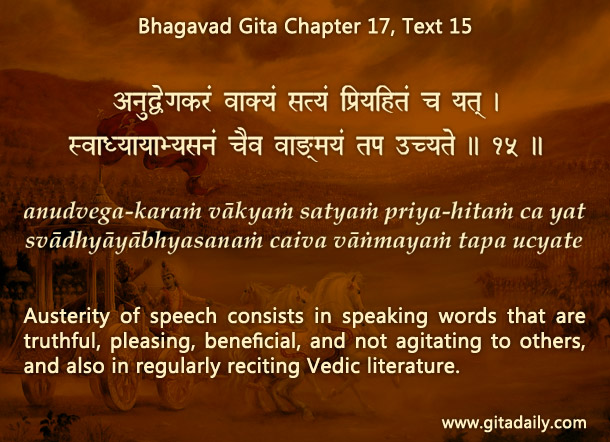In the Bhagavad-gita (17.15), Krishna outlines the characteristics of disciplined speech. Let’s consider how those characteristics are demonstrated by Krishna’s words in the Gita.
Non-agitating: Given that we live in a world that is agitating and that we have a mind that gets easily agitated, we need to speak in a way that lowers the social temperature, not raise it. Demonstrating such speech, Krishna never name-calls or demonizes Arjuna’s opponents for inciting him to fight.
Truthful: That we shouldn’t agitate others doesn’t mean that we hide potentially agitating truths from them, especially when those truths could help them in making sound decisions. Krishna doesn’t hesitate to tell Arjuna a painful truth about the latter’s reluctance to fight: the world will label him a coward, his peers will mock him and the resulting humiliation will hurt worse than death (01.34-36).
Pleasing: Even when the truth is unpalatable, we need to speak it in a way that keeps others encouraged to face life’s challenges. How? By adopting an affirming, pleasing tone. Throughout the Gita, Krishna gives Arjuna strength-giving assurances (08.05, 09.30-31, 18.64-66). Additionally, he refers to Arjuna by several epithets that refer to the latter’s many virtuous and glorious deeds. Through such references, he assures Arjuna that he can do the difficult duty expected of him on the battlefield..
Beneficial: In a sense, this guideline unifies and underlies the previous guidelines — helping, serving, benefiting others should be the primary purpose of all our speech. Krishna is everyone’s well-wisher (05.29) and he states repeatedly that he is speaking the Gita for Arjuna’s benefit (10.01, 18.64). And he does benefit Arjuna, transforming the latter’s initial dejection (01.46) into eventual determination (18.73).
Scriptural: Krishna indicates that his words echo scripture (13.05), for he is the composer and knower of scripture (15.15). In fact, he makes the essence of scripture available to Arjuna in a relevant and succinct form. And Krishna’s words have themselves become scripture that we can recite, thereby harmonizing our words with timeless wisdom.
One-sentence summary:
By demonstrating throughout the Gita the discipline of speech that he recommends in the Gita, Krishna walks his talk.
Think it over:
- How is Krishna’s speech non-agitating and truthful?
- How is Krishna’s speech pleasing and beneficial?
- How is Krishna’s speech scriptural?
***
17.15: Austerity of speech consists in speaking words that are truthful, pleasing, beneficial, and not agitating to others, and also in regularly reciting Vedic literature.
To know more about this verse, please click on the image




Krishna walks the talk